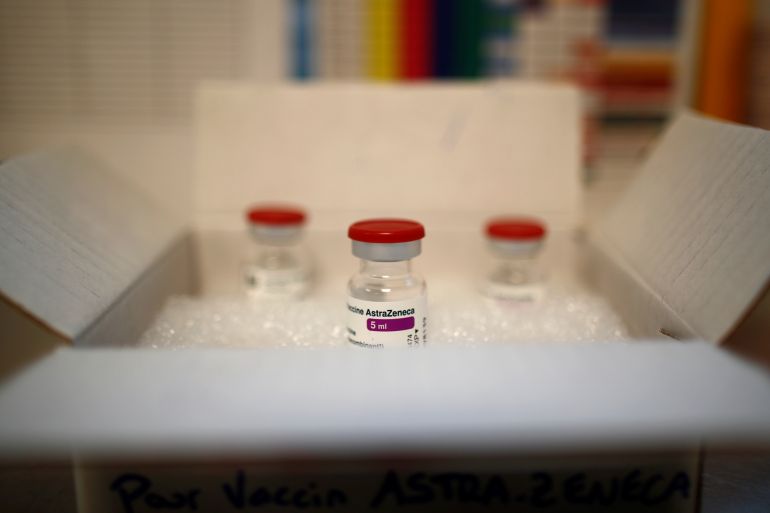AstraZeneca suspensions: What you should know, in 500 words
Which countries have stopped using the vaccine? Why? Is the vaccine safe? Three key questions answered.

Several countries, mostly European, have temporarily suspended the use of AstraZeneca’s COVID-19 vaccine over fears it may have caused some recipients to develop blood clots.
The measures come despite assurances from the British-Swedish multinational, European Union regulator the European Medicines Agency (EMA), and the World Health Organization (WHO) that the jab is safe.
Keep reading
list of 4 itemsGermany, France, Italy and Spain halt use of AstraZeneca vaccine
Which countries have stopped using AstraZeneca’s COVID vaccine?
Ireland temporarily suspends use of AstraZeneca vaccine
The WHO is reviewing available data on Tuesday.
On Tuesday, the EMA reiterated its stance that the vaccine is safe and its benefits outweigh any risks as coronavirus infections and deaths continue. The regulator will release results of its investigation into incidents of bleeding, blood clots and low platelet counts in recipients on Thursday.
Here is what you need to know:
Which countries have stopped using the vaccine, pending investigation?
More than a dozen countries have suspended the use of AstraZeneca’s shot.
Austria was first, pausing the use of a batch of the vaccine on March 7 while investigating a death from coagulation disorders and an illness from a pulmonary embolism.
Days later, Denmark stopped administering the shot altogether after a 60-year-old woman died of a blood clot after receiving the jab.
Norway announced it was also suspending AstraZeneca over reports of possible serious side effects, including bleeding, blood clots and a low blood platelet count.
Iceland, Bulgaria, Ireland and the Netherlands later said they were halting roll-outs, followed by Germany, France, Italy and Spain.
Sweden and Latvia became the latest to announce a pause on Tuesday.
Outside Europe, Indonesia and the Democratic Republic of the Congo have stopped the roll-out.
For more information on the suspensions, click here.
Why have they halted its use?
When vaccines are rolled out widely, scientists expect some serious health issues and deaths to be reported because millions of people are being inoculated and random problems would be expected in a group so large.
The vast majority of these end up not being connected to the vaccine but, because COVID-19 vaccines are still experimental and there is no long-term data, scientists must investigate every possibility that they could have unforeseen side effects.
Is the vaccine safe?
In response to the suspensions, AstraZeneca said on Sunday that it had reviewed the data on 17 million people who received doses across Europe and found 37 cases of people who developed blood clots as of March 8.
It said its findings showed “no evidence of an increased risk” of blood clots in any age group or gender, adding: “This is much lower than would be expected to occur naturally in a general population of this size and is similar across other licensed COVID-19 vaccines.”
The EMA says there is “no indication” so far that AstraZeneca’s shot has caused the blood clots, which are not listed as a possible side effect of the vaccine. The regulator is, however, probing individual cases.
WHO Chief Scientist Soumya Swaminathan said on Monday that there had been no documented deaths linked to COVID-19 vaccines and called on people not to panic.
Swaminathan added that so far, no link had been found between the vaccine and “thromboembolic events” reported.